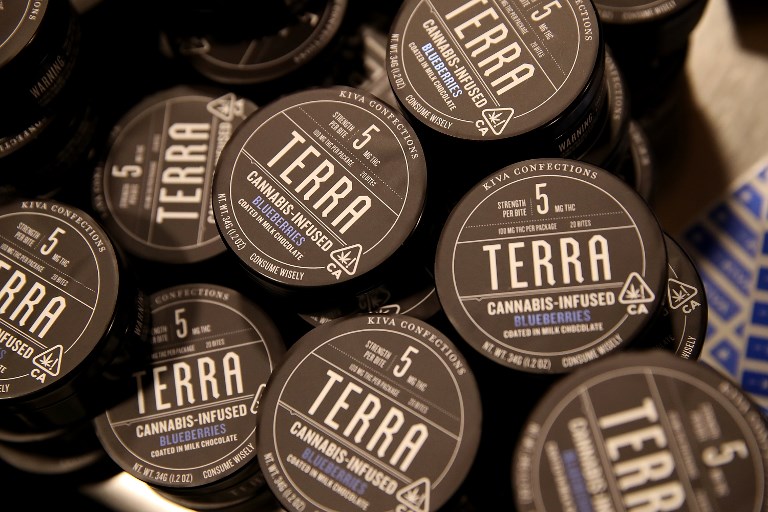
Marijuana-infused chocolate covered blueberries wait to be shipped at Kiva Confections on January 16, 2018, in Oakland, California. The number of emergency-room visits linked to cannabis in one hospital in the first US state to completely legalize its use tripled within a few years, according to a study that points to the dangers of ingesting the drug. AFP
WASHINGTON, United States – The number of emergency-room visits linked to cannabis in one hospital in the first US state to completely legalize its use tripled within a few years, according to a study that points to the dangers of ingesting the drug.
Colorado legalized marijuana for recreational use in 2014, the first state to do so, making the study published Monday in the Annals of Internal Medicine particularly noteworthy. Nine other states have now legalized cannabis for recreational use, while 34 of the 50 allow its medical use.
Researchers analyzed a half-million emergency-department visits at the University of Colorado hospital in Aurora from 2012 to 2016, of which roughly 2,500 were at least partially attributed to marijuana consumption.
The number of such visits has increased yearly, from less than 250 in 2012 to more than 750 in 2016.
While more than 90 percent of the visits were related to inhalation of the drug, the rest were linked to edible cannabis, whether in cookies, candy or any of the other food forms that have been used to ingest THC (tetrahydrocannabinol), the plant’s main psychoactive ingredient.
Andrew Monte, a professor of emergency medicine and the study’s principal author, said the tripling in total emergency-room visits was not altogether surprising.
“Whenever there’s a new drug in a community, that means there will be more emergency department visits associated with it,” Monte told AFP.
That applies even to conventional drugs, he said, like blood-pressure medications.
But the proportion of emergency-room visits linked to ingested cannabis is far higher than usage rates would suggest. In Colorado, edible cannabis represented only 0.3 percent of the total weight of THC sold, but accounted for 10 percent of cannabis-related emergency-room visits.
“I do think that part of it is naivete around the use of edibles,” Monte said.
“The edible phenomenon has been noticed by emergency physicians, but there’s never been any data to back it up, and these data do that,” he said.
“The effects of cannabis edibles are much more unpredictable, and unfortunately they last a lot longer, and that results in people ending up in the emergency department.”
“They’re not expecting to have bad anxiety effects or psychoses, and those effects last for a long time.”
Inhaled cannabis acts in less than 10 minutes, reaches peak concentration in the blood in 30 to 90 minutes and leaves the body in four hours.
Ingested cannabis, on the other hand, reaches its peak in three hours, and THC remains in the body for up to 12 hours.
That delayed action can lead first-time consumers to eat far too much, and too fast, leading to intoxication and sometimes acute psychiatric symptoms. /cbb